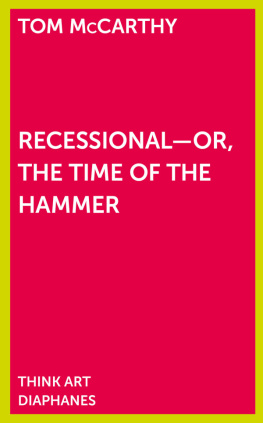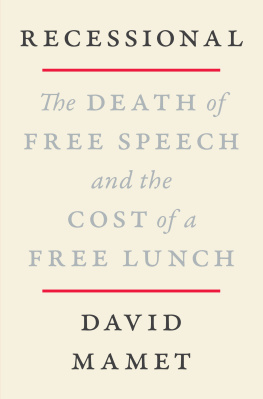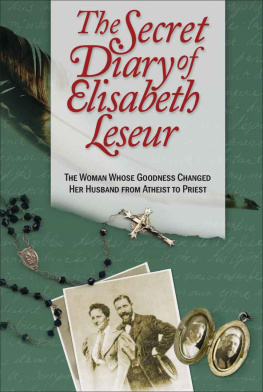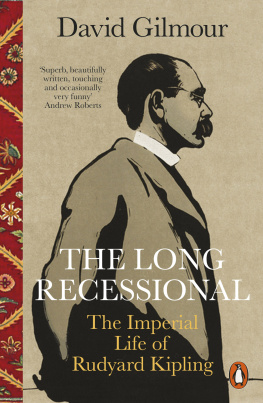Elisabeth Bronfen - Recessional, : or, the time of the hammer
Here you can read online Elisabeth Bronfen - Recessional, : or, the time of the hammer full text of the book (entire story) in english for free. Download pdf and epub, get meaning, cover and reviews about this ebook. year: 2016, genre: Art. Description of the work, (preface) as well as reviews are available. Best literature library LitArk.com created for fans of good reading and offers a wide selection of genres:
Romance novel
Science fiction
Adventure
Detective
Science
History
Home and family
Prose
Art
Politics
Computer
Non-fiction
Religion
Business
Children
Humor
Choose a favorite category and find really read worthwhile books. Enjoy immersion in the world of imagination, feel the emotions of the characters or learn something new for yourself, make an fascinating discovery.
- Book:Recessional, : or, the time of the hammer
- Author:
- Genre:
- Year:2016
- Rating:5 / 5
- Favourites:Add to favourites
- Your mark:
- 100
- 1
- 2
- 3
- 4
- 5
Recessional, : or, the time of the hammer: summary, description and annotation
We offer to read an annotation, description, summary or preface (depends on what the author of the book "Recessional, : or, the time of the hammer" wrote himself). If you haven't found the necessary information about the book — write in the comments, we will try to find it.
Recessional, : or, the time of the hammer — read online for free the complete book (whole text) full work
Below is the text of the book, divided by pages. System saving the place of the last page read, allows you to conveniently read the book "Recessional, : or, the time of the hammer" online for free, without having to search again every time where you left off. Put a bookmark, and you can go to the page where you finished reading at any time.
Font size:
Interval:
Bookmark:
Tom McCarthy
RecessionalOr,
the Time of the Hammer
Edited by Elisabeth Bronfen
diaphanes
Series THINK ART of the Institute for Critical Theory (ith) Zurich University of the Arts and the Centre for Arts and Cultural Theory (ZKK) University of Zurich
ISBN (ePub) 978-3-03734-615-0
ISBN (Mobipocket) 978-3-03734-616-7
diaphanes, Zurich-Berlin 2016
All rights reserved.
Layout: 2edit, Zurich
www.diaphanes.com
Contents
Tom McCarthy
RecessionalOr,
the Time of the Hammer
Towards the end of Thomas Pynchons mammoth 1973 novel Gravitys Rainbow , the stumbling ingnue of a hero Tyrone Slothrop sets off on a commando raid. The territory he and his cohorts move through is a giant metropolis, a factory-state in which capital, technology and power, perfectly co-calibrated, send airships drifting through urban canyons, past chrome caryatids and roof-gardens on skyscrapers that themselves shoot up and down on elevator-cables: a conurbation Pynchon calls the City of the Future or Raketen-Stadt. The raids target, though, is not a building; nor is it a person; it is, rather, time. Slothrop has been dispatched to rescue the Radiant Hour, which associates of a villain known only as the Father have abstracted from the days 24. As Slothrop, suiting up and setting out, is handed a note informing him, in matinee adventure style: The Radiant Hour is being held captive, if you want to see her , the bullets zinging past his head conveniently give over to a clock face, drifting, like the airships, through the sky.
How do we digest or get a bearing on this bizarre episode? The fact that one of the Floundering Four commandos is a very serious-looking French refugee kid named Marcel, a mechanical chess-player dating back to the Second Empire given to long-winded monologues, might point us towards Proust, inviting us to view Slothrops escapade as a reworking of that other raid on lost (or misappropriated) time, stage-managed by a writer who has put something extra in his madeleines . The intention was probably there on Pynchons partyet as I re-read the sequence a few weeks ago, my mind kept drifting (maybe it was the Franco-Germanic mix of Marcel and Raketen-Stadt, the general elevation of the setting) to another scene, another half-occluded precedent; one that plays out, like this evenings talk, in Switzerland.
Thomas Manns equally-mammoth work The Magic Mountain announces, right from the outset, an obsession with time. As Hans Castorp (another ingnue protagonist) winds his way up through mountains to the Davos sanatorium to visit his tubercular cousin, the space through which his train chuffs starts to take on the powers we generally ascribe to time. Numerous temporal meditations followon duration, on persistence, continuity, recurrence. As though foreseeing that Davos would become the seat of the World Economic Forum, Mann has one of Hanss teachers, Naphta, explain the global financial market to him as a temporally-grounded system, a mechanism for receiving a premium for the passage of timeinterest, in other words. At the outset of a chapter titled By the Ocean of Time, the form and very possibility of the book we are reading become similarly index-linked to time, For time is the medium of narration. Can one tellthat is to say, narratetime, time itself, as such, for its own sake? Mann wonders. No: That would surely be an absurd undertaking. Yet he concedes that any narrative contains two kinds of time: that of its actual time, the time it takes to iterate itself; and that of its content, which is extremely relative, such that a narrative that concerned itself with the events of five minutes might take up hundreds of hours, and, conversely, the contents of a moments iteration might expand beyond the extreme limit of mans temporal capacity for experience. The latter, expansive instances, he claims, are possessed of a morbid element and are akin to opium dreams in which something had been taken away from the brain of the sleeper, like the spring from a broken watch.
Hans plans to stay at the sanatorium for three weeks; but, himself diagnosed with TB on arrival, is held up there for seven years. His illness not only forces an extended delay, time off from his work as an engineer, a general time-out from his life; it also imposes its own temporality. When you are ill in bed, Mann writes,
All the days are nothing but the same day repeating itselfor rather, since it is always the same day, it is incorrect to speak of repetition; a continuous present, an identity, an everlastingnesssuch words as these would better convey the idea. They bring you your midday broth, as they brought it yesterday and will bring it tomorrow; and it comes over youbut whence or how you do not know, it makes you quite giddy to see the broth coming inthat you are losing a sense of the demarcation of time, that its units are running together, disappearing; and what is being revealed to you as the true content of time is merely a dimensionless present in which they eternally bring you the broth.
Colored by shades of eternity and entropy or run-down, illness-time is time that is drifting towards death. But it is also, in classic Freudian fashion, time that is homing in on pleasure. Illness makes men more physical, Mann notes; racking womens frames, consumption brings about a heightening and accentuation of their curves and outlines, turns them into beings exaggerated by disease and rendered twice over body. Phthisis and concupiscence go together, remarks Dr. Behrens, while his colleague Dr. Krokowski talks of love, forced underground by fear, conventionality, aversion, or a tremulous yearning to be pure, re-emerging in the form of illness. Symptoms of disease are nothing but a disguised manifestation of the power of love; and all disease is only love transformed.
These lines of thought play out dramatically (as those of you who have read the book will know) in the relation between Hans and fellow patient Claudia Chauchat (her name, beside denoting femininity and lust, is also that of a make of machine-gun). Hans experiences his desire for her as an extension and intensification of his illness. In a gesture that redeems a romantic clich by literalizing it, Mann has Hanss temperature, constantly thermometer-gauged, rise two notches every time he sees her; and, in a similar materialization of chivalric code, he makes him carry around an X-ray of her lungs, pressed tight against his chest: thus she becomes, like Pynchons stolen hour, both radiant and negative, abstracted. Though she remains beyond his reach for virtually the whole novel, he mounts a seduction in the books central episode, which takes place on Walpurgis Nighta festival or holiday abstracted even from the abstracted life of the sanatorium, time out of the time-out (almost, as Hans puts it, outside the calendar, intercalated, so to speak, a twenty-ninth of February). The seduction sequence begins with him re-enacting (unbeknown to Claudia) another episode that shaped his childhood when, aged thirteen, he borrowed a pencil from a boy on whom he had a crush. Recalling the childhood incident earlier in the novel has already caused him to be rapt back into the past so strongly, so resistlessly that his present body has seemed like that of a cadaver while the actual Hans Castorp moved in that far-away time and place; replaying it on Walpurgis Night as he asks Claudia for her pencil places him, once more, on the tiled court of the schoolyard.
Thus a complex, spring-like structure opens up, stretching and contracting such that quite separate moments touch or get embedded one within the other, with a synecdoche or marker for the act of writing (the pencil) running through it all. Lavishing praise on Claudias flesh destine pour lanatomie du tombeau, Hans asks to die with his lips pressed to hers. Most commentaries on The Magic Mountain interpret the fact that Claudia leaves the party at this point as a rebuff; yet her words in the doorway Noubliez pas de me rendre mon crayon Hanss pointedly late return to his own room, and Manns mention of more words exchanged between them that night at a later interval, wordless to our ears, during which we have elected to intermit the flow of our story along the stream of time, and let time flow on pure and free of any content whatever strongly suggest the opposite. If it is the writing implement that opens the approach to death-like pleasure up, though, it is the same one that, in Manns hands, places its consummation in a blind spot. Either way, content-time kicks back in the next day, and Claudia leaves, returning much later as the companion of the older Mynheer Peeperkorn, who, standing between Hans and her, becomes one more of Hanss surrogate fathers. Peeperkorn will commit suicide, while Hans, discharged, is sent off to the front of World War One, as the novels ironic ending sees the long, intimate, death-like intermission of the sanatorium give over to the wholesale mechanized slaughter of historical progression.
Next pageFont size:
Interval:
Bookmark:
Similar books «Recessional, : or, the time of the hammer»
Look at similar books to Recessional, : or, the time of the hammer. We have selected literature similar in name and meaning in the hope of providing readers with more options to find new, interesting, not yet read works.
Discussion, reviews of the book Recessional, : or, the time of the hammer and just readers' own opinions. Leave your comments, write what you think about the work, its meaning or the main characters. Specify what exactly you liked and what you didn't like, and why you think so.











